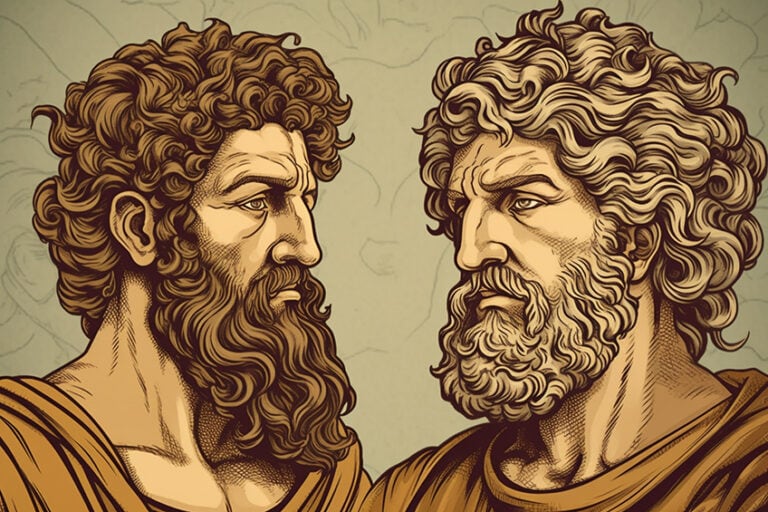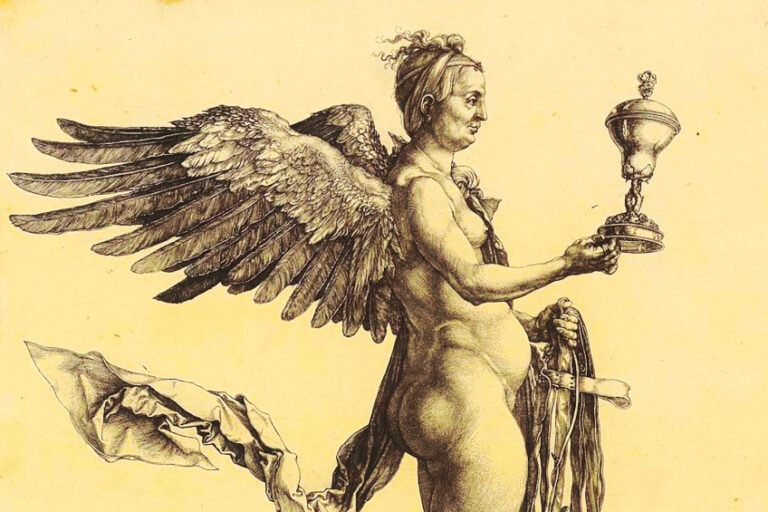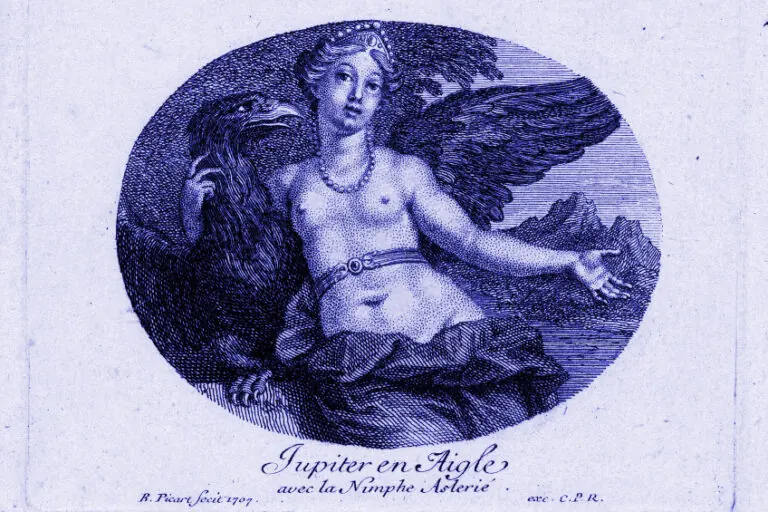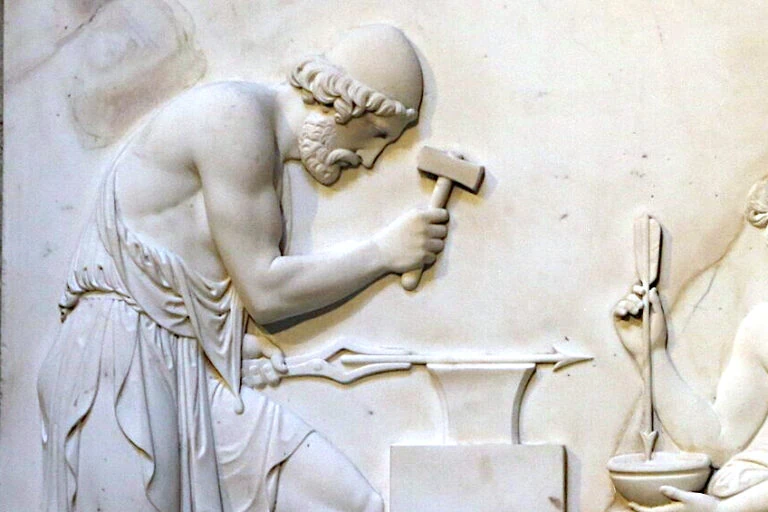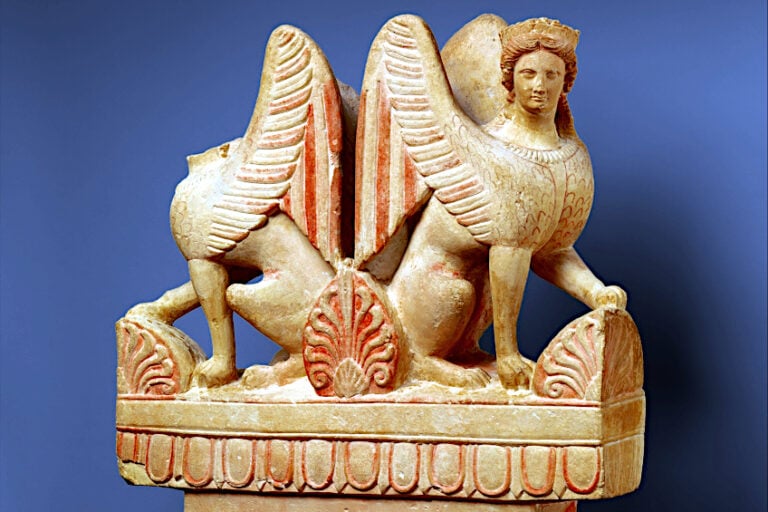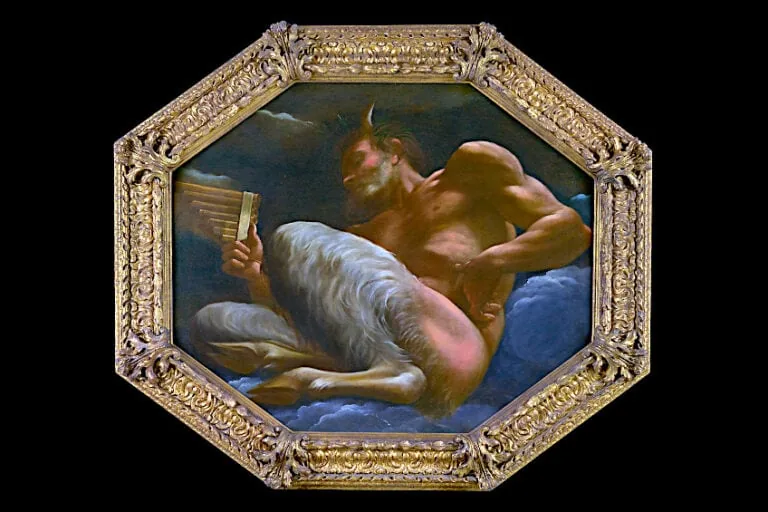Greek Goddess Metis – The Strategist Consumed by Zeus
The Greek goddess Metis is a largely unsung but pivotal figure in Greek mythology. As a feared yet invaluable counselor of Zeus and mother to Athena, she was considered the most knowledgeable of all the gods and men, and embodied the much-admired balance between wisdom and cunning. Find out the mystery of this powerful yet largely unknown goddess, and why Zeus decided to swallow her whole, in the article below!
Contents
The Most Knowledgeable of Gods and Men: Metis
| Name | Metis |
| Gender | Female |
| God of | Wisdom, cunning, intelligence, and deep thought |
| Personality | Wise, cunning, and prudent |
| Consorts | Zeus |
| Children | Athena and Poros |
| Parents | Oceanus and Tethys |
Metis was named as one of the elder Oceanids and the goddess who was Zeus’ first wife and wise counselor in the early days of Greek mythology. It was Metis who was considered the first goddess of wisdom and canniness by the time of Hesiod in the Archaic period of Ancient Greece.
Her story largely ends with Zeus swallowing her whole and her subsequent disappearance from Greek mythology.
Background and Family of the Wisest Oceanid
The Titans is usually a term to refer to the elder group of gods who ruled the cosmos prior to the Olympians, and specifically the twelve children of Gaia and Uranus. While some of their descendants, like Atlas and Helios, are referred to as a Titan Metis herself belongs to the group known as the Oceanids. Her elder status amongst the Oceanids and her role and power during the time before the Olympian era, leads many to refer to her as the Titan Metis even though she herself never explicitly receives the distinction in classical sources.
Interestingly, Oceanids usually have some connection to specific bodies of water or water in general, however, little can be found of any associations with either in the case of Metis other than her daughter Athena’s connection with the river Trito.
As a name Metis was more closely connotated with the meaning of “magical cunning”, and more closely linked with figures such as the wily Greek god Prometheus. Metis was one of the sharp-witted and far-sighted planners of early Greek myth, though later and more stoic interpretations of her linked with virtues of wise counsel and prudence which survived to popularity in the 15th and 16th centuries.
 Metis as wise counsellor to Zeus; artist’s impression
Metis as wise counsellor to Zeus; artist’s impression
Metis as a Greek word encapsulates a trait that blended cunning and wisdom. This quality was well admired in Greek society, praised in heroes such as the mythical Odysseus, and in the classical era was considered a notable Athenian characteristic. Zeus himself is titled as ‘Mêtieta‘ meaning “the wise counselor”, though whether Metis is viewed as a largely inconsequential minor goddess or an aspect of Zeus is up for debate.
Family of the Greek Goddess Metis
The Greek goddess Metis is an Oceanid, meaning she is one of the innumerable daughters of the Titan Oceanus and his sister-wife the Titaness Tethys. Her siblings count the other Oceanids, and the equally innumerable Patomai, who were the Oceanids’ male siblings.
Metis was also considered the first wife of the Greek god Zeus and the mother of his daughter Athena, the goddess of wisdom, war, and crafts.
The Significance of Metis in Greek Mythology
In some myths, Metis is an integral player in the beginnings of Greek mythology and the world as it was known to the ancient Greeks. Wise and cunning, the Greek goddess was a vital advisor to Zeus before and immediately after his war against his father the Titan Cronus.
Metis’ most significant role is as the mother of Athena, the goddess who guided and helping the great heroes of Greek mythology.
The figure of Athena represents the fusion of the power of Zeus with the intelligence of Metis, becoming the pre-eminent symbol of ancient Greek values.
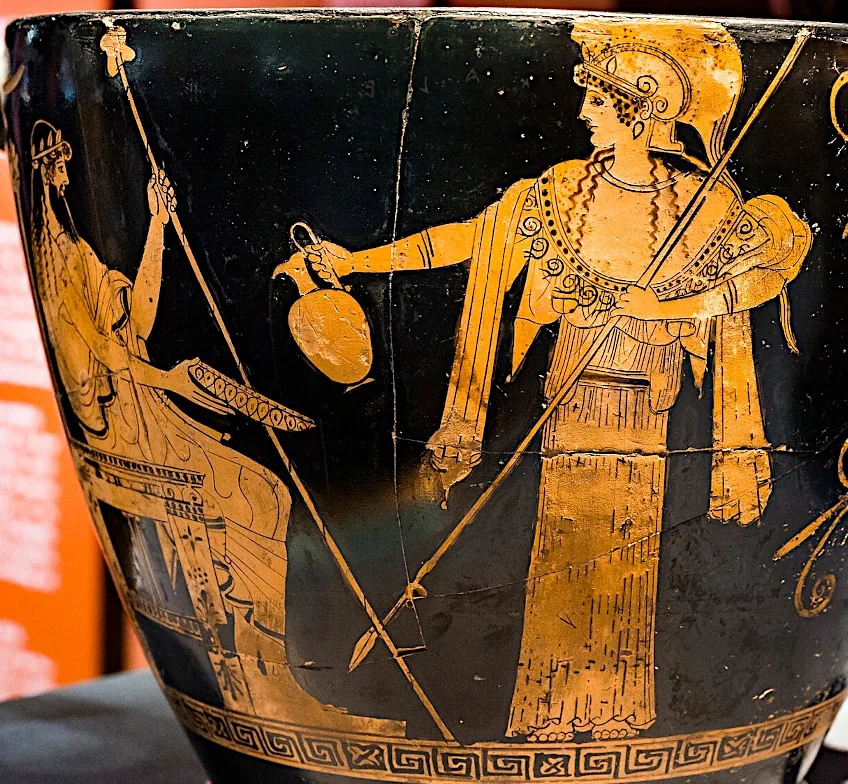 Attic red-figure skyphos with a depiction of Athena and Zeus by the Lewis Painter (c. 480-470 BCE); ArchaiOptix, CC BY-SA 4.0, via Wikimedia Commons
Attic red-figure skyphos with a depiction of Athena and Zeus by the Lewis Painter (c. 480-470 BCE); ArchaiOptix, CC BY-SA 4.0, via Wikimedia Commons
Metis the Advisor
Metis existed primarily during and a bit after the events of the ten-year war of the Titanomachy. Cronus had overthrown his father Uranus the Sky Father, or alternatively the more orphic divine pair of Ophion and Eurynome, and ruled as the Titan-king of the Golden Age of Greek mythology. Following this he received a prophecy from his parents Gaia and Uranus that he would be overthrown by his children just as his own father was overthrown.
In response, he ate every child his sister-wife Rhea bore until she saved the sixth child, Zeus, who would grow to free his siblings and war with them against Cronus.
In some versions it was Metis, who according to Homer “knew more than all the gods or mortals”, who gave Zeus the potion that induced Cronus to vomit up his children. Metis is considered an invaluable ally to Zeus during the war and after it, with her great and wise counsel being indispensable to his burgeoning reign.
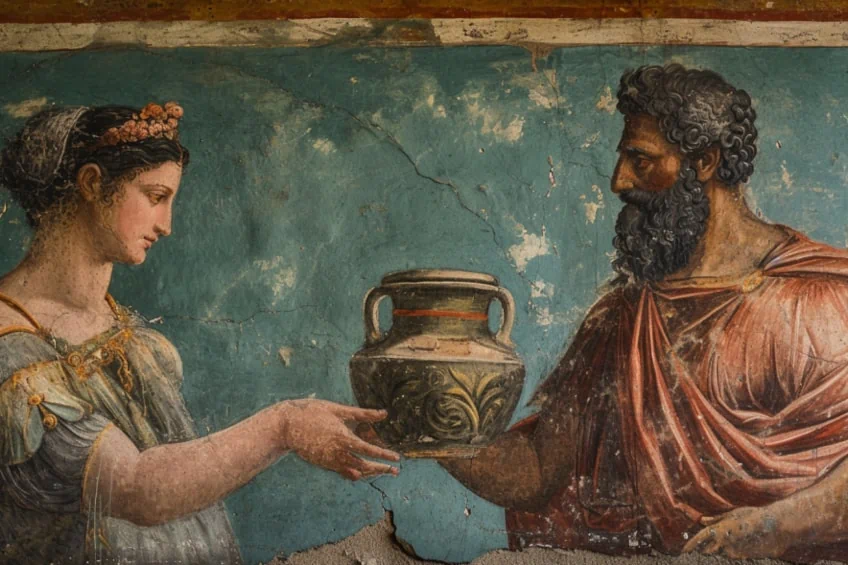 Metis provided Zeus with the potion that would induce Cronus to vomit up his children; artist’s impression
Metis provided Zeus with the potion that would induce Cronus to vomit up his children; artist’s impression
The Swallowing of Metis
During or after the Titanomachy Zeus pursued and married Metis, making it her and not Hera who was Zeus’ first wife. Zeus received a prophecy, however, that Metis would bear a daughter wiser than her mother and then a son greater than his father. To prevent this prophesized son from overthrowing him as he did to Kronos, Zeus deceived Metis into turning into a fly before he swallowed her whole. At the time Metis was pregnant with the elder female child, who would become the goddess Athena.
What exactly happened to Metis following this is not outright stated but largely implied. Cunning Metis exists within Zeus’ being, birthing and raising Athena by hiding behind Zeus’s inner workings.
Metis is said to craft for Athena the mighty armor, shield, and spear she wields. The noise of their creation or Athena banging them together gives Zeus such a headache he eventually has the god Hephaestus split his head open to relieve the pain or get rid of whatever was causing it. Out of this wound jumps the goddess Athena, landing on the banks of the river Trito and the wound closes before Metis can escape.
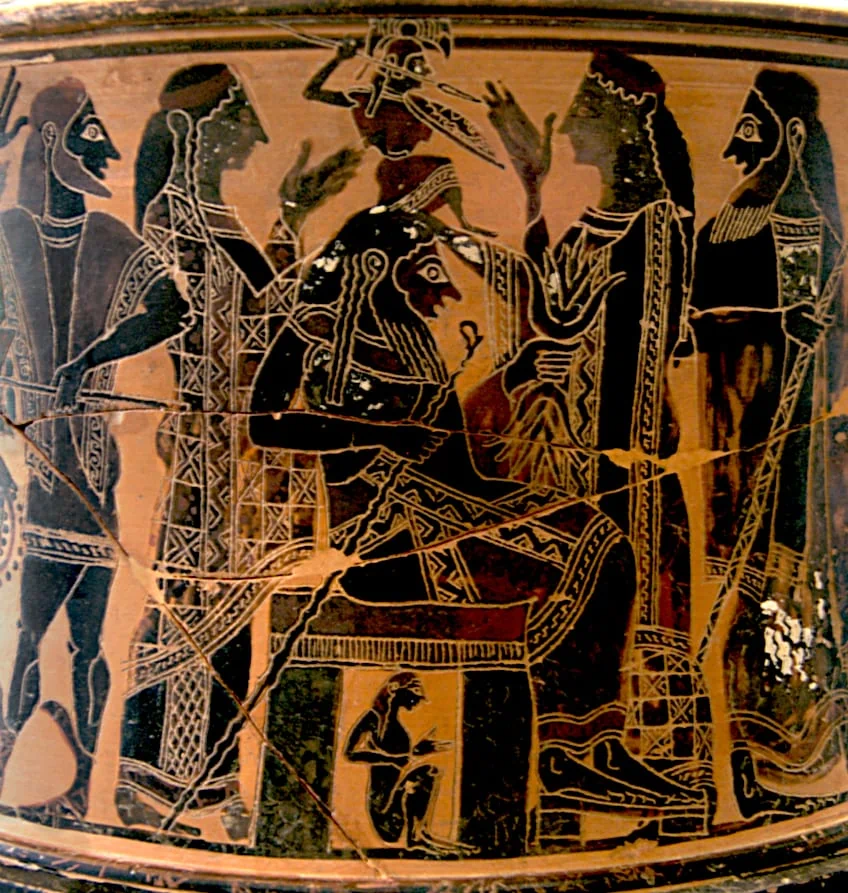 Attic black-figure tripod with a depiction of the birth of Athena with Metis crouching beneath Zeus’ throne by the C Painter (c. 570-560 BCE); C Painter, CC0, via Wikimedia Commons
Attic black-figure tripod with a depiction of the birth of Athena with Metis crouching beneath Zeus’ throne by the C Painter (c. 570-560 BCE); C Painter, CC0, via Wikimedia Commons
Metis was implied to be wholly subsumed into Zeus after or around the time of Athena’s birth, existing as either a part or aspect of Zeus, who holds the epithet ‘Mêtieta‘ meaning “the Wise Counsellor”. Sources other than Hesiod point to Athena being described as a “motherless goddess” who was born fully formed, for the idea that Metis had since ceased being an independent existence from Zeus.
In Hesiod’s writings, he was said to have devoured Metis so she would “think for him, for good and for evil”, suggesting she continued to be a source of wisdom for him even after her devouring removes her voice and presence from the world.
Some have suggested Zeus had taken on not only Metis’ cognitive abilities but her feminine knowledge and attribute of bearing children as well, as seen by him “birthing” Athena and perhaps some versions of Dionysus. This has no traditional support, however, and has little known bearing in Greek mythology or religious practices.
Metis in Alternative Myths
Aside from Hesiod’s account of her, she is mentioned in various alternative myths. Apollodorus’ Bibliotheca made Metis an unwilling quarry of Zeus, who changed into a multitude of forms in an effort to escape from him. Another version of the original myth places the Cyclops Brontes into the role of Zeus, and names him Athena’s father.
Plato himself adds a son to Metis in the form of Poros, the embodiment of resourcefulness or “creative ingenuity” and a grandson in Eros.
The more esoteric Orphic traditions instead elevate her to stand beside Eros, the Greek personification of love and desire, as one of the primal forces of the universe at the early beginning of the cosmos.
What We Know of the Greek Goddess Metis
Metis is an intensely cerebral deity, in both the metaphorical and literal sense. Metis is described as the “fair-cheeked daughter of Tethys”, however little else is known of her appearance outside of her post-devouring depiction as a small, winged spirit behind or beneath Zeus’ throne. The gods of Greek mythology were masters of shifting forms, and Metis was no different by taking a variety of forms across mythology.
 Metis takes various forms in Greek myth; artist’s impression
Metis takes various forms in Greek myth; artist’s impression
Metis is known to be the wisest and most knowledgeable being in Greek mythology. Her plans and advice are implied to be so useful and irreplaceable that the lure of having them behind his own interests overcame Zeus’ fear of her power. His devouring of her neatly allowed Zeus to have his cake and eat it too, using her wisdom as his own but ensuring she could never bear a child to overthrow him.
Hesiod’s Theogony states that Metis was one of the first to come to Zeus’ aid against Kronos and was his greatest advisor, showing her integrity, forthrightness, and shrewdness, and her title as the “worker of right actions”.
Whether this is her seeing the way the wind was blowing or the moral right is unclear, but evident throughout mythology is her ability to pick the course of actions that leaves her on top. Interestingly while some myths have Gaia and Uranus divulging the prophecy of Metis’ powerful children to Zeus, others hold she was the one to disclose it to her husband herself.
Worship of Metis
Metis has little to no evidence remaining of any influence she held in the cult life of the ancient Greeks. We know little of how she as an independent goddess was viewed, what Metis’ symbols were, or how and when she was honored. This is not strange for either the Titans or the Oceanids, as they fill a mostly genealogical and cosmological role in Greek mythology and are largely inconsequential in comparison to the Olympian gods and heroes.
Interestingly ‘metis’ as a trait encompassing a balance of wisdom and cunning was a highly admired trait in ancient Greek heroes and sometimes specific identities such as that of Athenians.
This could imply she was held in some kind of high regard, but this may also be a general admiration for the concept she came to embody and thus a more subtle influence she whispers into the world, much like she herself lives on in whispers in Zeus’ mind.
The Modern Legacy of Metis
We do not know much of how Metis was viewed or interacted with in ancient Greek life, not what Metis’ symbols were nor if she had any cult influence at all. Myth, however, is an enduring tradition that holds lessons that grow and change depending on the eye of the beholder, and modern eyes have much to say about her myth.
 How to make sense of the myth of Metis; artist’s impression
How to make sense of the myth of Metis; artist’s impression
Metis’ role is a common one shared by many of the elder generations of Greek gods, serving as embodiments of natural forces and concepts to explain their origin and the way of the world as the Greeks conceptualized it. Most commonly Metis, as an older and prudent daughter of Titans, is an explanation of the source of Zeus’ divine wisdom and the power and domains Athena boasts amongst the other Olympians.
Metis As A Voice For The Unheard
Greek mythology in general reflected the patriarchal nature of ancient Greek society, where women were excluded from school and social and political events, and restricted to the roles of marriage, childbearing, and maintaining the household. The goddesses of Greek mythology are often shown as having great power and freedoms alien to the everyday woman, but Metis shows that this was not wholly the case.
The wisest of all gods and mortals was a goddess, but unlike Prometheus or Odysseus, we hear nothing about her.
In her sole myth, she was married and bore children, was stricken from all social life and the world itself for the power she would have given those children, and was made to put her skills to use to serve Zeus’ goals thanklessly for eternity. Metis as both Zeus’ advisor and mother of the future male child suggested to one day usurp him, is bound to male authority in both agency in value despite her lauded superior intellect and prudence. In this way, we can see how mythology could have reflected and influenced ancient Greek society in equal turns.
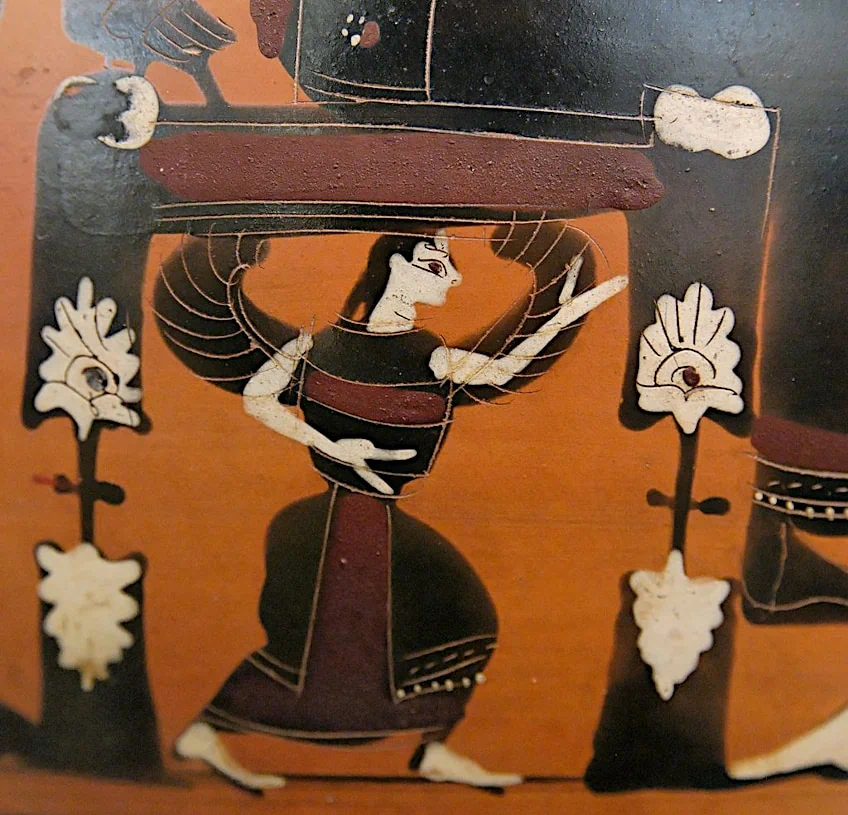 Black-figure belly-amphora with a depiction of a winged goddess, possibly Metis underneath the throne of Zeus as Athena is born from his head (550-525 BCE); Louvre Museum, CC BY 3.0, via Wikimedia Commons
Black-figure belly-amphora with a depiction of a winged goddess, possibly Metis underneath the throne of Zeus as Athena is born from his head (550-525 BCE); Louvre Museum, CC BY 3.0, via Wikimedia Commons
The story of Metis has also sparked much debate in modern times, particularly regarding the role of the cunning quality of metis circumventing power structures and feminist discourse. Rhetorical cunning and shrewdness can be vital to navigating the confines of power structures in both interpersonal relations and larger social hierarchies. Athena was born fully grown, trained, and armored, and became Zeus’ greatest ally, a strategic mastermind to counterbalance Ares the god of mindless violence.
Metis’ advice is also what allowed Zeus to overthrow Cronus’ reign in the first place, her input making it a fight he could win by changing the conflict to one of wits and allies, rather than pure brute strength.
 Metis taught Zeus the value of strategy and alliances in warfare; artist’s impression
Metis taught Zeus the value of strategy and alliances in warfare; artist’s impression
Some writers explore the parallels between Metis’ story and the influential women who are reduced to simple helpmates rather than the active and valuable partner they really are. A parallel explored is that of first wives of businessmen who are often more educated, wise, and socially savvy than their ambitious husbands and often belong to the social status he wishes to join. Like Metis, these first wives are often indispensable and wholly overlooked, up until their husband becomes successful enough to not need them anymore and promptly divorces them, where they then fall into obscurity.
Discussions centered around the silenced and exploited women of the world, and the topical themes of ‘behind every great man is a greater woman’, have made Metis’ voice heard once more in the world through how people interact with her myth.
Why Did Zeus Swallow Metis?
When examining why Zeus would swallow Metis, it is essential to consider the destructive nature of the cycle of divine succession that preceded Zeus. Unlike the reigns of Uranus and Cronus, the Olympian order persisted because Zeus ensured that no son capable of overthrowing him could come into existence.
Metis was too valuable to lose, so Zeus absorbed her into himself so that he would always be able to outwit anyone and everyone.
The birth of Athena from this unique fusion of power and intelligence represents the value that ancient Greeks placed on these attributes, exemplified in the real world by the military, artistic, scientific, and philosophical achievements of the citizens of Athena’s own city state of Athens.
 The School of Athens by Raphael (1509-1510); Raphael, Public domain, via Wikimedia Commons
The School of Athens by Raphael (1509-1510); Raphael, Public domain, via Wikimedia Commons
Metis’ embodiment of prudence, of being able to plot out the wisest course one can find in one’s circumstances quickly and accurately, is a quality every person throughout history can admire. Metis uses knowledge as her weapon and plans her moves to outthink adversaries even in the direst of circumstances. From her alliance with a fledgling usurper Zeus, to her hiding and arming Athena in her swallower’s own interiors, Metis makes the best of her situations with a cunning intellect that means no one can deny her skill at surviving. Even as a whispering spirit behind Zeus’ throne, we are forced to acknowledge to influence and power Metis has held over the world.
The Greek goddess Metis played an important role in overthrowing the Titan Kronos and Zeus’ establishment as king. The size of her shadow stretches far, coloring the existence of Zeus’ cunning plans and the unstoppable force that is Athena, while also being an evocation of the struggles of the exploited and women in the modern day. We are as taken with the fright-worthy quality of her cunning and wisdom as many figures of ancient Greek myth were, and hope you share in our admiration of this ancient and powerful, but little-known, Greek goddess.
Frequently Asked Questions
What Role Did Metis Play in Greek Mythology?
Metis was the wisest being in existence, and the premier advisor of Zeus in his quest to overthrow his father Kronos and become the ruler of gods and mortals. She provided him the emetic that freed his siblings and her advice during the Titanomachy. She is also considered his first wife, the mother of the goddess Athena, and the source of Zeus’ divine cunning after he swallowed her.
Why Did Zeus Swallow Metis?
Metis was prophesied to bear a daughter wiser than her and a son more powerful than his father. Zeus came to know this prophecy and feared a son born of their union would one day overthrow him. To halt the prophecy, he convinced Metis to transform into something small, commonly a fly, and swallowed her whole so she could not bear a son but still provide him with her wise counsel.

I am deeply passionate about history and am constantly fascinated by the rich and complex stories of the past. As the editor-in-chief of learning-history.com, I have the opportunity to share this passion with a wide audience through the creation and distribution of engaging and informative content about historical events, persons, and cultures. Whether it’s through writing articles and blog posts or creating videos or podcasts, I strive to bring the past to life in a way that is both accurate and enjoyable. My expertise in history, combined with my strong writing and communication skills, allows me to effectively communicate complex historical concepts and make them accessible and interesting to a wide range of readers. I am truly grateful for the opportunity to share my love of history with others through my work on learning-history.com.


